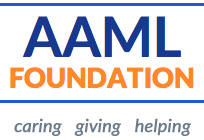Grant Policies
American Academy of Matrimonial Lawyers Foundation Grant Policy
POLICY STATEMENT
The American Academy of Matrimonial Lawyers Foundation aspires to elevate the standards of family law practice through the funding of programs to educate the public, Judges, and attorneys about various aspects of family law. The Foundation solicits proposals for programs or activities which promote these goals and awards funds to those organizations which the Foundation deems most meritorious.
PROGRAM FUNDING GUIDELINES
The Board of Directors of the American Academy of Matrimonial Lawyers Foundation will consider grant applications for proposals designed to:
- Provide financial assistance to organizations by way of grants in order to help protect families, parents and children adversely affected by the breakup of the family unit;
- Support projects pertaining to children in custody disputes, dependency cases and similar situations;
- Support programs in schools, courts and organizations to help children cope with the breakup of families;
- Teach mothers, fathers and parental caregivers how to co-parent effectively;
- Provide counseling to children of families experiencing domestic violence, drug and alcohol abuse and mental illness;
- Promote relationship enrichment programs to help prevent the breakup of families;
- Promote pro bono and low-cost family law legal representation and ancillary mental health services for both indigent clients and their children, who are adversely affected by the breakup of the family unit; and
- Promote innovation, research and education in support of the mission of the Foundation.
As a general rule, the Foundation will give priority to projects which are either initiated and completed within the grant year or receive funding from other sources after the Foundation provides the initial start-up funds. Also, a grant awarded to an approved applicant will ordinarily not exceed $5,000 and not exceed a 12-month budget period.
ELIGIBLE APPLICANTS
To be eligible to apply for funds from the American Academy of Matrimonial Lawyers Foundation, an applicant must:
- Be a U.S.-based organization that has received a determination letter (which is in effect during the application process) from the Internal Revenue Service that it qualifies as an exempt organization under Section 501(c)(3) of the Internal Revenue Code; or
- Be able to demonstrate that the proposed project for which the funds will be used qualifies as an activity in which a Section 501(c)(3) organization is permitted to engage; or
- Be an individual or individuals who provide research and/or education involving issues pertinent to family law.
PROGRAMS NOT ELIGIBLE FOR FUNDING
Grant awards will not be made to:
- Organizations designed primarily for lobbying or dissemination of religious or political views;
- Political organizations or campaigns;
- Endowment funds or campaigns;
- Scholarship funds or campaigns;
- Lawyers or law firms in private practice; or
- Organizations substantially funded by the Legal Services Corporation or its equivalent.
GUIDELINES FOR AMOUNT OF ANNUAL GRANTS AND FUNDING
Unless otherwise determined by the Board, the annual amount of funding for grants will be at least as follows:
- The Foundation will grant between 4% and 8% of the April 30 balance in our cash accounts in a given year. The Board will determine, within that 4% to 8% range, in each year, what percentage to give. The determination in each year shall be made by a majority vote of each member and officer, rather than by a majority of a quorum present at a meeting where the vote is taken.
Non-Discrimination Policy for Grants
It is the policy of the American Academy of Matrimonial Lawyers Foundation to support organizations, projects and programs that do not discriminate on the basis of race, color, religion, national origin, sex, gender identity, sexual orientation, age, disability, or any other legally protected characteristics. The Foundation does not knowingly award grants to organizations that discriminate in their hiring or those they accept as volunteers or the clients they serve.
